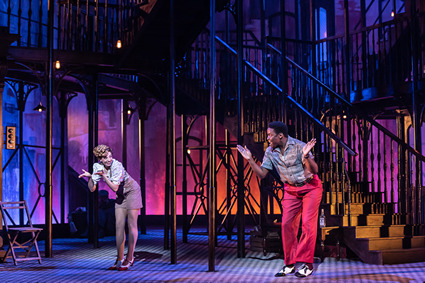| Opera Reviews | 25 April 2024 |
Opera North's Street Scene is full of vim and verveby Catriona Graham |
|
Weill: Street Scene
|
|

Michelle Andrews (Mae Jones), Rodney Vubya (Dick McGann)
|
|
|
Some like it hot but, for the residents of tenement number 346 of an unnamed street in Manhattan, it’s too darn hot. Kurt Weill’s 1947 American opera Street Scene, of Elmer Rice’s 1929 play, with lyrics by Langston Hughes, is a vignette, 24 hours in the lives of these residents, performed with vim and verve by Opera North. Director Matthew Eberhardt and designer Francis O’Connor set the action in the stairwell, where people come and go, call up or down to others on the stairs and landings, and children run in and out, playing. It is an ensemble piece, with a huge cast, and the chorus of Opera North rise to the challenge, taking various solo parts – not so easy when the libretto reflects the variety of Englishes spoken in the tenement. The trio of gossiping housewives - Mrs Jones (Claire Pascoe), Mrs Fiorentino (Miranda Bevin) and Mrs Olsen (Amy J Payne) – are a delight, both in their command of idiolect and their interest in the goings-on in their immediate environs; Mrs Buchanan going into labour, the Hildebrands being dispossessed for failing to pay the rent, is Mrs Maurrant having an affair with Mr Sankey, the milk collector? All this, though, is but the context for the main story, whether Rose Maurrant and Sam Kaplan will get together. Rose (Gillene Butterfield) is the sort of pretty girl who never lacks admirers but her best friend is the quiet studious neighbour Sam (Alex Banfield), who is working to qualify as a lawyer. This is aspirational America, after all, even the dispossessed Hildebrands are celebrating the eldest daughter’s success at the college of commercial art. Laura Kelly-McInroy as Jennie Hildebrand gives a lively rendition of "Wrapped in a Ribbon and Tied in a Bow." Rose’s parents are going through a bad patch. Frank – Robert Hayward in powerful form – is old-fashioned in his attitudes; he loves his wife and daughter, just doesn’t find the right way to express that love, while his wife Anna (Giselle Allen) finds her marriage has lost its spark, her children are growing up, and there isn’t much to her life any more except the dishes. Least aspirational are the Joneses – Vince (Christopher Nairne) fancies Rose and his sister Mae is only interested in dancing; Michelle Andrews and Rodney Vubya as her friend Dick sing and dance with pizazz. When Frank’s insecurities result in the shooting of his wife and Mr Sankey, it makes the papers early enough for two nursemaids to include the tenement on their charges’ daily airing. The sharp wit of their duet is worthy of Cole Porter – the influence of Broadway is clear in Weill’s music. There are complex trios as well as the effervescent "Ice Cream Sextet." But it is Butterfield and Banfield who have the big numbers, with the high emotional intensity. Banfield is totally committed, as Sam, Butterfield clearly torn between her aspirations, her heart and her head. Howard Hudson lighting invokes the passing of time – the early morning is beautifully lit – and Gary Clarke moves the cast round the set slickly, especially the children, who sing and dance superbly. James Holmes conducts with panache – catching the darkness as well as the light in Weill’s score.
|
|
| Text © Catriona Graham Photo © Clive Barda |
|







